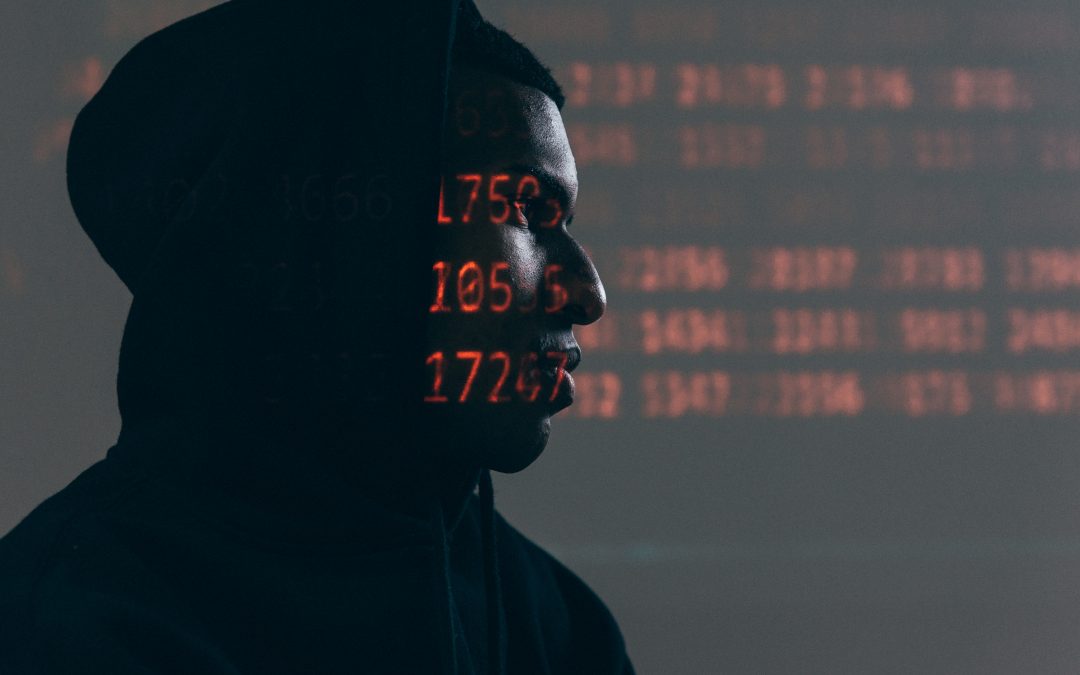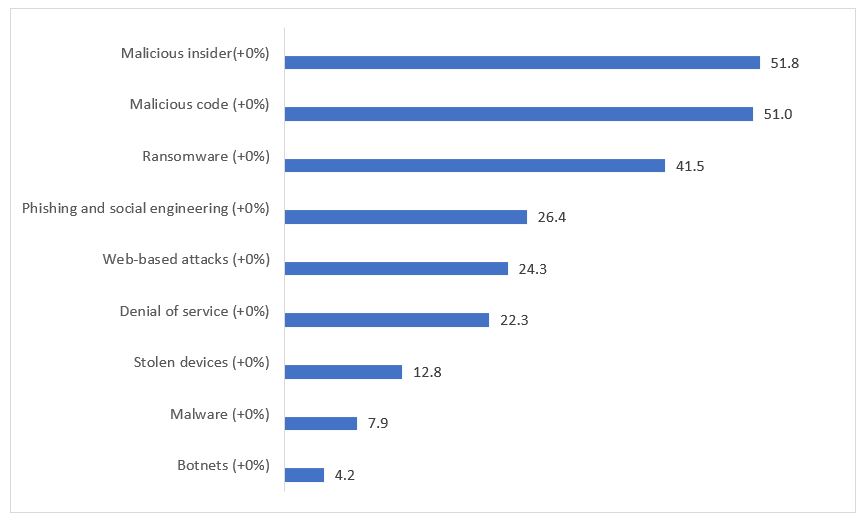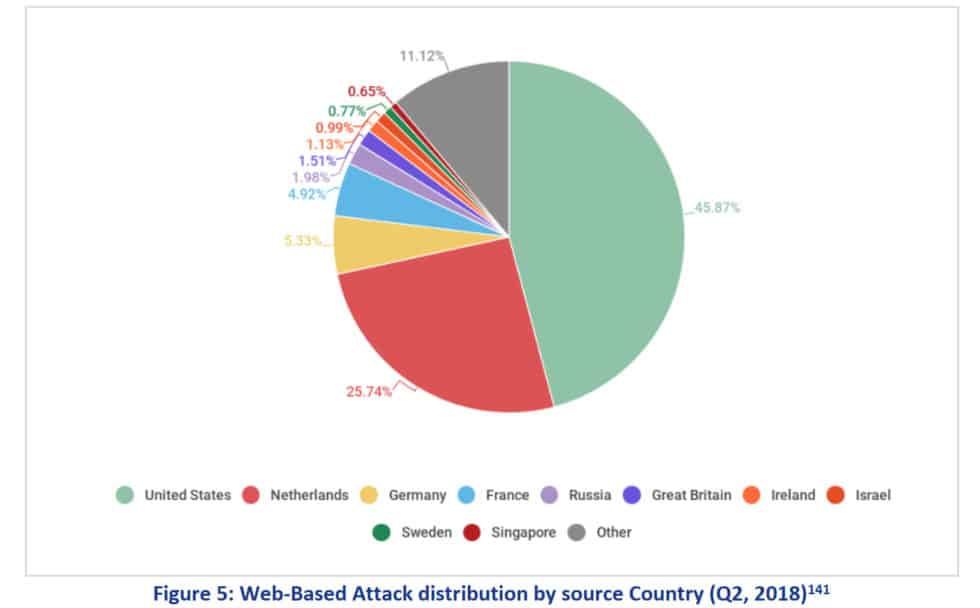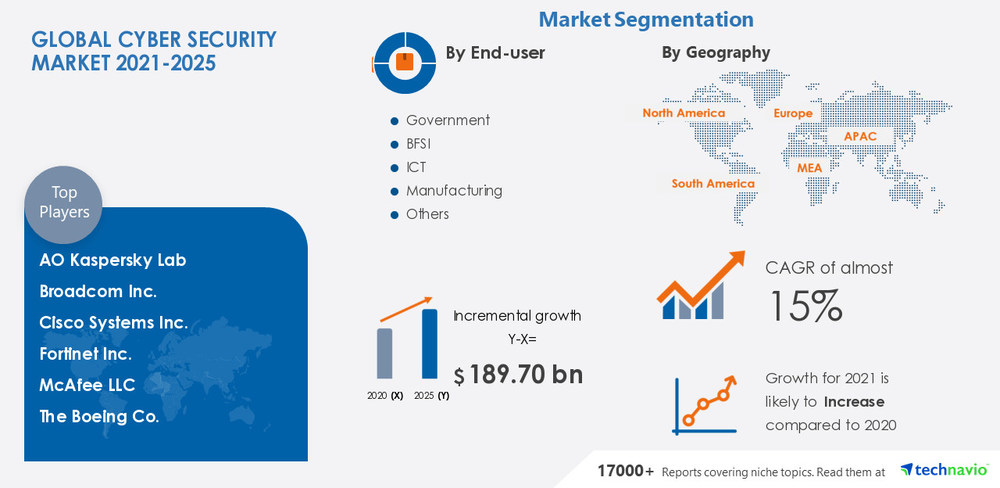
by Anika D | Nov 15, 2022 | Cybersecurity
With the advent of the digital revolution across industries, even governments now depend on computerized systems to manage their business activities. It makes their systems more vulnerable to cyber-attacks and phishing activities. It is where cybersecurity comes into the picture.
And just like other technologies, this industry has undergone tremendous evolution since its inception. Therefore, enterprises that aim to stay at the top should keep updating their current cybersecurity systems. This is what this blog post is about. Stay with us as we outline the top seven cybersecurity trends enterprises should look forward to in 2023.

Source
Artificial Intelligence
The combination of Artificial Intelligence and Machine Learning has revolutionized cybersecurity. We all know how adaptive AI can change the customer experience in various sectors.
Therefore, experts consider it paramount in developing automated security systems, face detection, natural language processing, and automatic threat detection. AI-powered threat detection processes can further help enterprises by predicting potential attacks. It can instantly notify the admins of any data breach.
Automotive Hacking
Modern vehicles are packed with advanced software and technological features that create uninterrupted connectivity for drivers. It is widely used in engine timing, cruise control, airbags, door locks, and delivery assistance systems.
The usage of Wi-Fi and Bluetooth makes these vehicles vulnerable to hacking. Developers are looking forward to gaining more control over such activities by developing anti-automotive hacking systems.
Work From Home Cybersecurity
Pre-pandemic, everything enterprise-related systems were present under one roof. It made their security management quite easy. All the procedures were regularly updated and were safe from malware and spyware. However, the work-from-home culture has wreaked havoc on organisations’ sensitive data post-pandemic.
Studies have also shown that the employees indirectly or directly made over 34% of the total attacks. Therefore, enterprises expect developers to create a robust security net in 2023. It will cover all the direct and indirect systems that connect with the main server at a point in time.
Developing a Security-Aware Culture
It is high time employees acknowledge that cybersecurity is not alone an IT issue. Every professional today must have a hold on the basics of cybersecurity. It will help him safeguard the sensitive company information saved on his devices.
So, in 2023, companies want to create a more security-aware culture. Besides this, businesses are also planning to train their workforce about the best practices to avoid email security compromise.
Supply Chain Attacks
Do you know that over 62% of global companies faced a supply chain attack in 2021? Hackers enter company networks through compromised third-party devices. With more advanced and robust techniques and tools, combating these attackers has become a challenge for companies.
Therefore, it is vital that businesses adopt more proactive approaches to analyze and observe user behavior to identify suspicious access and patterns.
Bottom Line
So, these are the top five cybersecurity trends that enterprises should look out for in the next year. It is high time; businesses get geared up to combat the high-tech hackers. They can also hire market experts to provide a better security blanket to their systems.

by Anika D | Aug 5, 2022 | Cybersecurity, Emerging Technology, Information Technology
Emails are part of every business in today’s world, but it is also one of the biggest security risks. BEC (Business Email Compromise) is rising every year. In addition, it is becoming common for criminals to use different phishing and spoofing attacks to probe organizations. In recent years, Ransomware has been growing rapidly and poses a greater risk to companies. What you don’t know is that email is a common entry place for Ransomware.
Source
But no need to worry about this. There are some countermeasures to this issue. These email security practices can go a long way for organizations from several threats. Here are some best practices to avoid Business Email Compromise:
Use Strong Passwords
It would be best to use strong passwords that meet the following criteria:
- It must complete a minimum length requirement.
- It must contain letters and numbers.
- It must contain both lowercase and uppercase letters.
- It may not have full name data.
- It should not be a commonly guessed password like 123456 or abcdef.
Use 2FA (Two-Factor Authentication)

Source
Many people think that only professionals can do 2FA, but it is not a difficult task. It is more like adding another shield to the account. Thankfully, almost every platform offers 2FA, but you can use another email provider if your system doesn’t support it. Also, if a hacker guesses your password, 2FA will stop them from entering before they get a sneak peek of your emails. Usually, two-factor authentication codes are sent to you by email, SMS, voice calls, or OTPs.
Be Careful of Suspicious Attachments
Nowadays, file sharing in the workplace mostly happens via collaboration tools like OneDrive, Dropbox, or Sharepoint. Therefore you should treat every file attachment in the mail suspiciously, even if it is from your colleague. Be more careful about the attached file with unfamiliar extensions or one that commonly delivers malware payloads (.zip, .exe, .scr, etc.).
Never Access Your Emails from Public Wi-Fi
If you take the office devices home or open your work emails from personal devices, do not access emails on public Wi-Fi. It is because cybercriminals can easily discover data passing through publicly accessible Wi-Fi. So, your sensitive data and login credentials both are at risk. Accessing emails is best when you are confident about network security. Opt for a safer option using mobile data or internet dongles outside the office.
Change Password Regularly
Many people keep passwords for years. But it is one of the biggest cybersecurity mistakes. The simplest yet most effective email security practice is regularly changing passwords. You must ensure the following things:
- Have a new email password after every 2 to 4 months.
- Use devices or do it yourself instead of leaving it to other people to update credentials.
- Do not add one of two characters to the current password when creating a new one. Change the entire password.
- Do not use passwords that you already used in the past.
Wrapping Up
BEC is a criminal phenomenon that has potentially severe consequences. BEC criminals usually live outside the country, so it is difficult for law enforcement to prosecute them. Therefore, prevention and detection are crucial. So, all companies should educate their employees and create an environment encouraging compliance.

by Anika D | Apr 4, 2022 | Cybersecurity, General
Cyber attacks are the new age ” war” as the data is crucial. Whether you’re a common person, a startup, a bank, or any organization, you can always welcome attacks. In this new age era, everyone stores all the valuable information on the Cloud. The exchange of every detail is with the help of the internet; it’s crucial to protect it more than ever. So, to avoid all this; keep reading to know seven serious cybersecurity mistakes you’re probably making.
#1 Using a Single Password for all the Accounts

Source
It is probably the most common and ignored mistake people make. If you’re using a strong password for all the important accounts, all your accounts are at risk if one of them is compromised. In 2020 identity theft was up by 42%, compared to 2019. So, use different and strong passwords for all the crucial accounts.
#2 Skipping Updates
Skipping authorized necessary software updates on phones and laptops can prove dangerous. As US banks are getting ready for attacks from Russian hackers, the professionals have advised individuals to be alert too. If you’re not updating software regularly, your system becomes vulnerable and easy for breaching. So, update it timely.
#3 You Always Click on “Agree”
It’s obvious as one can’t read and go through everything and then click on “I Agree” on internet pages. But, it can be very dangerous and bring malicious viruses to your account. So, before clicking “I agree” next time, type:
- On a Windows PC, press Control + F.
- On a Mac, press Command + F.
Now, type in terms like “third party,” “GPS,” “tracking,” and “data.” You will find out if there is any data permission. With the US becoming a 6G power, it will welcome some great attacks, and you must take steps with alertness.
#4 Using Unprotected wifi
Using unprotected wifi to work on crucial information is dangerous. For example, suppose you’ve started a venture, and your startup needs a website. While accessing the website, you’re on public wifi. Hackers can easily decode your location with data and ruin your website. So, avoid using public wifi or using VPNs while doing it.
#5 Not Keeping Track of all Online Accounts

Source
Cybercrime is Up by 600% after COVID 19, and at this rate, you can’t think that you’re safe. So, keep track of all your social media accounts as they have your contact details, payment info, and other valuable data. So, having old unused accounts means someone can hack the information. So, take some time, track them all, and delete the unused ones.
#6 Don’t let every App run Your System
The computers and phones come with loads of pre-installed apps. You may never check them, thinking they are safe, and you can’t delete them. But, this puts your information at risk. Many professional hackers can attack these apps to attack your system. So, keep checking and delete them timely.
#7 Depending Solely on Antivirus
Businesses suffered 50% more cyberattack attempts per Week in 2021, and you may think that antivirus is enough. Well, it is not. It would help if you had a firewall, third-party solutions, and staff training. Also, your home computers must have robust firewalls.

by Anika D | Mar 7, 2022 | Blockchain, Cybersecurity, Emerging Technology, Industrial IoT
The worldwide military apparatus undergoes significant transformation to strengthen capabilities. Some of the latest technologies like Artificial Intelligence, Robotics, and the Internet of Things optimize military efficiency and defense operations. Nowadays, hybrid approaches replace traditional warfare. The latest technology trends are transforming battlefields in the aspects like lethality, connectivity, sustainability, and autonomy.
Connectivity solutions mark concerns like how to communicate or direct operations. In addition, advances in weapons and missiles improve lethality, making effective battlefield operations. In the case of autonomy, companies utilize AI and robotics to execute strategies without human interference. Finally, startups are increasing sustainability with technologies including electrification and additive manufacturing.
Some of the emerging technologies that advance the defense field are listed below:
Artificial Intelligence

Source
The usage of AI in the army boosts computational military reasoning for ISR (intelligence, surveillance, and reconnaissance) missions. It empowers autonomous weapon systems and enables equipment safety management resulting in minimum casualties. By controlling machine learning and digital twin technology, defense manufacturers check new military product iterations and allow predictive military assets maintenance.
Advanced Military Equipment
Defense is making more advanced and sophisticated defense equipment to counter increasing threats. Innovations starting from space militarization to directed energy weapons are underway. Moreover, the defense industry is placing its goal to achieve net-zero emissions.
For example, it invests in electrification methods by using electric propulsions in military aircraft and testing hydrogen fuels. In addition, many companies are advancing research in nanotechnology and biotechnology for creating equipment like self-healing armors, etc.
Internet of Things (IoT)
Applications of IoT in the army include connecting planes, ships, drones, soldiers, tanks, and operating bases in the cohesive network. It enhances perception, response time, and situational awareness. AI, 5G, and Edge computing support the smooth data flow across all military branches, strengthening the control and command structure.
Big Data Analytics
The warfare future depends on information and the ability to extract in-depth knowledge. Army with the capabilities to pull out the critical data quickly and accurately and then securely spread the information will have an advantage. Big data analytics decipher insights from the various sources to do that.
Cyber Wars

Source
Military systems are most vulnerable to cyber-attacks that potentially lead to classified military information loss and army systems damage. Over the last ten years, the severity and frequency of cyberattacks have increased.
As a result, related army equipment security for significant institutions and nuclear security are substantial areas to deal with. In addition, militaries are developing aggressive cyber warfare capabilities, from ransomware and malware to phishing attacks.
Blockchain
Blockchain offers information security while sharing relevant data with the concerned parties. Therefore, defense startups create blockchain-based solutions to save confidential military data and prevent cyber threats. Its other applications in the defense industry include procurement process streamlining, supply chain security, and device tracking.
Final Thoughts
Understanding that the war landscape changes exponentially with new technologies is essential. For example, intelligent systems, lethal autonomous weapons, and AI are significant drivers for offensive and defensive army capabilities. Therefore, companies make dual-use technologies and military modernization solutions for civilian and military benefits.

by Anika D | Mar 3, 2022 | Cybersecurity, Information Technology
The western nations imposed several severe sanctions on Russia after it invaded Ukraine. As a result, banks are ready as they’re predicting revenge in the form of cyberattacks or cybercrimes. So, let’s discover all the buzz around this news.
So, What’s the News?
Last Saturday, the scenario between Russia and the West became very intense. The United States and its allies blocked Russian central banks from the SWIFT international payment system. Also, they moved the decision to place restrictions on the Russian Central Banks reserves.

Source
Western countries and the United States were already aware of the tension increasing between Ukraine and Russia. So, cyber security was taking all measures to stop cyber crimes from Russia and its supporting nations. As a record, 58% of cyberattacks from nation-states originated in Russia, according to Microsoft. So, the response is quite apparent.
A Serious Threat to Banks – Cyberattack ?
Earlier Microsoft warned of a destructive cyberattack on Ukrainian computer networks, and soon after, the attack on Ukraine began. So, with all the western countries opposing Russia’s moves. So, what kind of cybercrime can western countries face as a retaliation?
So, all the activities going on for a few months and its response has made the Global Banks a target for a cyber breach. They have begun with robust cyber security staff, training, advance monitoring, and clearing all bugs for any data leaks. Banks are especially preparing for ransomware, malware, DoS attacks, theft, and data wiping.
Various popular banks like Citigroup Inc (C.N), Morgan Stanley (MS.N), JPMorgan Chase & Co (JPM.N), Goldman Sachs Group Inc (GS.N), Bank of America Corp (BAC.N) have refused to share their course of action for dealing with any potential threat.
Even though banks have a robust cybersecurity plan, they are on alert for dealing with any attack. But unfortunately, a minor carelessness can cost too much.
Response of Famous Personalities
Some of the influential personalities presented their say on the matter. Already cybercrime is 600% up after COVID, and such robust growth of attacks is a little problematic. So what did some famous people say:
According to Valerie Abend, who leads Accenture’s global financial services security group, “Banks are incredibly prepared. They have taken out their playbooks, and it’s practice, practice, practice.”

Source
Swarthmore Group’s senior manager of fixed income portfolio, Steven Schweitzer, said there would be some revengeful measures by Ukraine and its allies. However, the least costly thing is some cyber-attacks.
The global head of intelligence at the Financial Services Information Sharing and Analysis Center, Teresa Walsh, expressed her views too. She said it wouldn’t be wise not to prepare for some retaliation. The Ukraine and allies have been giving signals in general issues for now. She asked everyone to be cautious of cybercrimes. Walsh also said that the preparation must begin now and that no one should wait for the crises.
Bottom Line
So, with all the buzz going around for months, western countries are protecting their valuable data at all costs from cyberattacks. Although banks are powered with strong cybersecurity, some careless glitches can still cost a lot. Also, It has been advised to write an effective cyber security strategy action plan for private businesses too.

by Anika D | Feb 12, 2022 | Cybersecurity, General
On Saturday, Microsoft warns Ukraine of destructive malware in their government and private systems. It was revealed as the Russian troops were massed at the borders of Ukraine and many government agencies had their websites defaced.
It is possible that the malware can copy and leak confidential information from the government systems in Ukraine. The mastermind behind the malware is not clear, but agencies point fingers towards Russia for this cyberattack. The reason for this is the tension across the Ukraine-Russia border these days.
According to New York Times, the code appear and deploy shortly after talks stalled among Russian diplomats, the U.S., and NATO. Further, Microsoft claims that the code looks similar to ransomware and designed to render targeted devices inoperable.
What is the Solution to Malware Detected on Ukraine Systems?

Source
Microsoft stated that all companies should investigate to know the origin of the malware. Also, every company should implement the defense through malware to protect data.
A Ukrainian security official told Reuters that the government believes the hackers are connected to Russia. They further stated that Russia’s intelligence services carried out the cyberattack on government websites in Ukraine. But, Moscow denied the involvement in cyberattacks against Ukraine.
How to Protect the System from Cyberattack?
According to Verizon’s 2019 Data Breach Report, about 28% of data breaches are connected to malware. It threatens every organization and is becoming more common every day. Countries and companies should both work hard to prevent their data from destructive malware.
Further, there is no solution to cyberattacks, but you can detect the malware and protect your system with smart moves. Here are some tips for you to save your computers or laptops from cyberattacks.
- Always choose a strong password for your private and confidential data files.
- Try to include at least eight characters with an uppercase letter, a lowercase letter, a number, and a symbol in the password.
- Enable multi-factor authentication on your system, such as a PIN or security questions in addition to a password.
- Do not save the password on your browser or your system. It is better to remember the password in mind.
Keep in mind that no software is completely safe against malware. But the software vendors regularly update their products to make them more defensive against viruses or cyberattacks. Install and update anti-virus software on your system to protect them from potentially destructive malware. Also, never share your password with anyone.
Conclusion
Malware infections can be devastating for organizations. By interrupting critical workflows and stealing or encrypting crucial data, it can cause serious financial and reputation damage. Protect yourself and your business from cyberattacks with effective cybersecurity. Also, perform regular backups to offline storage and keep changing your passwords to make sure your system is free from viruses.















